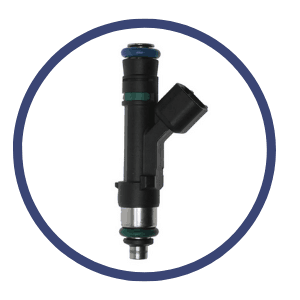Fuel injectors can go the life of a vehicle with little to no trouble at all. That being said, bad fuel injectors are still one of the more common vehicular problems. There’s always more than one, and one going bad is enough to make a noticeable impact on the drivability of the vehicle.
There are two main ways that your injectors can go bad. The first is for them to become clogged, dirty, or unresponsive. When this happens not enough fuel enters the combustion chamber. The other way an injector can go bad is if it begins to leak. A leaking fuel injector can really do some damage.
Bad Fuel Injector: Symptoms
The symptoms of bad fuel injectors are going to feel almost the same as a bad fuel pump or fuel filter. That’s why it’s important to check the fuel pressure at the rail before replacing injectors, otherwise you may end throwing good money after bad. If you do end up needing to replace the injectors, they are somewhat affordable.
Dirty | Clogged | Unresponsive Injectors
- Difficult to start– When some of the cylinders aren’t getting the right amount of fuel, it can be very difficult for the engine to turn over. It might not even start at all.
- Idle Issues– With a fuel injector that is not properly atomizing fuel properly, it may be difficult for your vehicle to idle. It’ll feel almost exactly the same as if it had a bad spark plug. That is to say there will be a sudden drop in idle speed. It may feel like the engine is about to die.
- Emissions Issues– When the fuel is not entering the combustion chamber in the right quantity, the engine may adjust the air/fuel mixture, which can lead to increased exhaust emissions.
- Loss of Power– Typically, as the engine RPM increases, you won’t be able to “feel” the engine misfire as much. But, you’ll definitely notice the lack of power.
- Less Fuel Mileage– Your vehicle’s PCM is constantly adjusting the air/fuel ratio and timing to get optimal combustion. When the fuel injectors aren’t working properly it can’t do that and fuel mileage suffers.
- Knock/Detonation– Detonation can cause your engine to blow. This is certainly the worst case scenario. Don’t ignore an engine that isn’t running right. You’ll do way more damage in the long run by not fixing the problem now.
Leaking Injectors
A leaking injector can cause all of the problems listed above, as well as:
- Thin Oil– When a fuel injector leaks, all of that fuel is not getting burned in the combustion chamber. Gas that is not fired and sent out as exhaust ends up in the oil pan. When this happens it can decrease your vehicle’s engine lubrication to the point that it’ll lock up. You will smell fuel on the dipstick.
- The Smell of Fuel– When your engine is getting too much fuel, your car or truck can’t burn it all. You’ll probably notice the smell of gas as you are driving locally. On the highway, there’ll probably be too much wind for you to catch it.
- Engine Locks Up– Once too much gas gets in the oil, the motor will lock up. If you have reason to suspect there is gas in your oil, change it immediately.
Bad Fuel Injectors Diagnosis
Leaking fuel injectors are often caused by a bad crack in their body. When this occurs they must be replaced.
If the injectors are clogged you’ll need to have them cleaned by a professional. When they are dirty but not yet clogged, you may be able to clean them with a good fuel injector cleaner.
Here is a great video from “Ratchets and Wrenches” on YouTube on how to go about the process of diagnosing a fuel injector from beginning to end.
Conclusion
If your vehicle is experiencing the symptoms of bad fuel injectors, it would be wise to address the issue right away. If there is anything you would like to add, please feel free to leave a comment below. Good luck!

